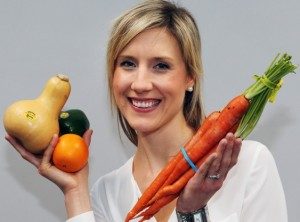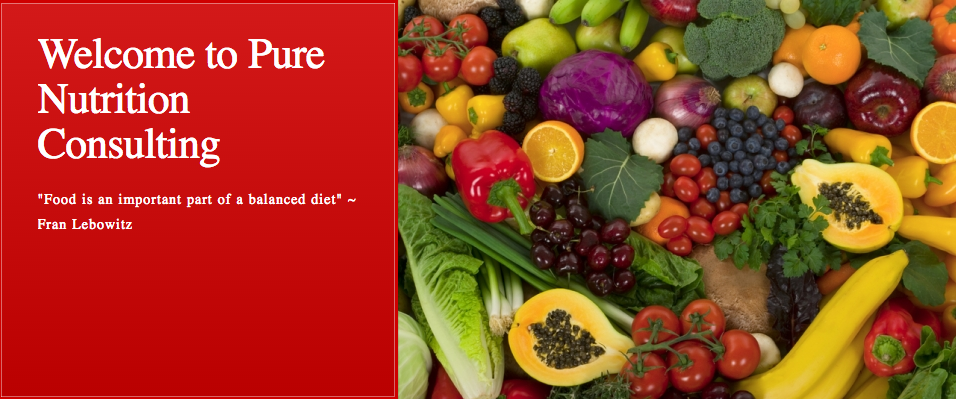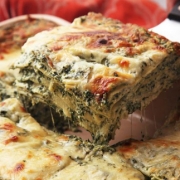Irritable Bowel Syndrome – Misdiagnosis or Co-diagnosis?

Julie Kostyk, BSc., RD (cc Times Colonist)
Julie Kostyk, Registered Dietitian, loves to share her knowledge of planning and preparing delicious and nutritious meals to fit any and every lifestyle. Here, she provides us with her insights into celiac disease, irritable bowel syndrome and whether the two conditions can co-exist.
April is Irritable Bowel Syndrome (IBS) Awareness Month
With an estimated prevalence of 10-15% of the population, it is likely that you have either heard of IBS, know someone with IBS, or perhaps have even been diagnosed with IBS yourself.

photo credit badgut.org
It is not uncommon to hear that people who have been diagnosed with Celiac Disease (CD) received an initial diagnosis of IBS at some point in their medical journey, especially considering that it takes an average of 11 years to receive a definitive diagnosis of CD. While it is definitely possible for people with CD to have a co-diagnosis of IBS, it is very important that individuals presenting with symptoms consistent with both IBS and CD get the proper testing to rule out CD first, in order to prevent a misdiagnosis.
What are the symptoms of IBS?
Symptoms of IBS include: abdominal pain, cramping, bloating, distension, constipation and/or diarrhea and flatulence.
What can I do if I have CD but I am still experiencing IBS symptoms, despite following a strict gluten-free diet?
It is very important that you seek the assistance of a medical professional if you are experiencing digestive symptoms, in order to rule out any other medical causes. If it is deemed that you may have a co-diagnosis of IBS, you may find relief in following the low FODMAP diet.
What is the low FODMAP diet?
FODMAP is an acronym for: Fermentable Oligo-, Di, Mono-saccharides And Polyols. The low FODMAP diet restricts groups of short-chain carbohydrates that are poorly digested and thus become fermented in the large intestine, leading to the symptoms described above. Research has shown this diet to be very beneficial in providing significant symptom improvement in up to 70-80% of individuals with IBS.
What foods are high in FODMAPs?
High FODMAP foods are common in the typical North American diet. An example of some high FODMAP foods are apples, pears, watermelon, onions, garlic, wheat, honey and milk (to name a few). It is important to note that FODMAPs are always carbohydrates and thus the nutrient of concern in wheat is the carbohydrate and not the gluten, which is a protein. It is also important to know that a low FODMAP diet is not a gluten-free diet as some foods that are allowed on the diet will still contain gluten. If you have CD and are trying the low FODMAP diet in addition to your gluten-free diet, you will need to be cautious to also exclude low FODMAP foods that contain gluten.
How do I start the low FODMAP diet?
The diet is meant to be dietitian-taught, to ensure nutritional adequacy during the period of restriction (typically 6-8 weeks). Long-term continuation of the diet is not recommended and reintroduction of foods usually begins after the 6-8 week period of restriction. It is strongly encouraged that you seek out a FODMAP-knowledgeable dietitian for assistance.
Source:
Dietitians of Canada. Gastrointestinal System – Irritable Bowel Syndrome. In: Practice-based Evidence in Nutrition® [PEN]. 2015 Sept 15 [cited 2017 Mar 18]. Available from: https://www.pennutrition.com. Access only by subscription. Free trials available. Click Sign Up on PEN login page.
About Julie

Julie offers inspiration and support to others through Pure Nutrition Consulting. Click for details
Julie completed her nutrition degree at the University of Alberta and has been working as a dietitian for over 10 years. She has worked in many areas of nutrition, including weight management, digestive health, sports nutrition, pediatrics and pre/post natal health. She enjoys keeping up-to-date with the latest in nutrition research, such as the FODMAP diet and food elimination/challenges for digestive or overall health.
Julie enjoys being active and has completed a variety of running events including half marathons and team relay races as well as the 2015 Mudderella in Whistler. Her true passions include cooking, gardening, traveling, and spending time with her husband, golden retriever and two cats.
Julie loves to share her knowledge of planning and preparing delicious and nutritious meals to fit any and every lifestyle.
[email protected] 250-701-5863
Pure Nutrition • Facebook • Twitter • Blog
Do you have a question for Julie? Leave a comment at the bottom of the page or click here.

Pure Nutrition Consulting is a team of Registered Dietitians serving Greater Victoria and the Cowichan Valley. We are regulated health professionals and strive to help people navigate the ever-changing world of nutrition to optimize their health.
|
|
|
We offer a supportive and personalized approach to support your nutrition goals. Is your gluten-free diet providing you or your child with all the necessary nutrients? A detailed computerized nutrition analysis can offer you that instant insight.
- PERSONAL – Meet with us one-on-one, either in person or over the phone/ internet to review your nutrition history, lifestyle and goals.
- NUTRIGENOMICS – It is a simple genetic test using your saliva that will allow for personalized nutrition recommendations that are based on your DNA Results are available in 2-4 weeks. A detailed report and recommendations suited to your individual needs will be provided and discussed with you.
- DIGESTIVE HEALTH – A comprehensive review of eating for healthy digestion. Work to identify and ease your personal triggers and digestive symptoms. FODMAP diet review and implementation. Review your nutrition history, symptoms, lifestyle and goals.
- MEAL PLANNING – A personalized meal plan for 7day, 14 days or completely customized.
- FAMILY – packages starting at $300
- PRE & POST NATAL – Pregnancy is a very exciting time in a woman’s life. Good nutrition can support you in a healthy pregnancy and ensure that your baby has the proper nutrients they need for their development. Good nutrition following your baby’s birth is vital. Eating the right foods can help you to ensure you are meeting your nutritional needs while losing your pregnancy weight.
- SPORTS – Nutrition plays a key role in optimal athletic performance. Make sure your diet habits aren’t slowing you down! Meet with us one-on-one, either in person or over the phone/ internet to review your nutrition history, lifestyle and goals.
- CORPORATE WELLNESS • PRESENTATIONS • RECIPE ANALYSIS
DIRECT BILLING
- Julie is pleased to work with your insurance company to oversee the paperwork. No doctor referral necessary. Short or no wait time.
Also by Pure Nutrition Consulting
- Your Gluten-Free Grocery Cart
- Just Been Diagnosed with Celiac Disease? Now What?
- Making Your Gluten-Free Diet Stick!
- When Your Fruit Bites Back – Oral Allergy Syndrome
- When Eating Hurts – Could it be Eosinophilic Esophagitis
- Receive a Detailed Computerized Nutrition Analysis
- Take the Fight Out of Food!













